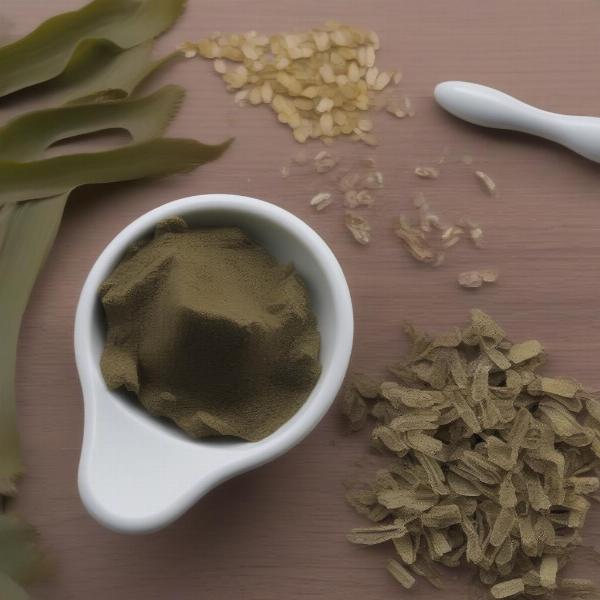Dog food with kelp is becoming increasingly popular, and for good reason. This nutritious seaweed offers a wealth of potential health benefits for your canine companion, from supporting a shiny coat to potentially boosting their immune system. But what exactly is kelp, and how can it benefit your dog? Let’s explore the world of dog food with kelp and discover why it might be a valuable addition to your furry friend’s diet.
Kelp is a type of large brown seaweed packed with vitamins, minerals, and antioxidants. It’s a natural source of iodine, which is crucial for thyroid function. Kelp also contains other essential nutrients like iron, magnesium, potassium, and vitamins A, C, and K. These nutrients can contribute to a dog’s overall health and well-being in various ways.
The Potential Benefits of Kelp for Dogs
Adding kelp to your dog’s diet can offer a range of potential benefits:
-
Improved Coat Health: Kelp is rich in omega-3 fatty acids, which can contribute to a healthier, shinier coat. These fatty acids can also help reduce skin inflammation and itching.
-
Enhanced Immune Function: The antioxidants present in kelp can help protect cells from damage and support a healthy immune system.
-
Thyroid Support: Kelp is a natural source of iodine, a vital nutrient for proper thyroid function. However, it’s essential to consult your veterinarian before adding kelp to your dog’s diet, especially if they have any existing thyroid conditions.
-
Potential Anti-Cancer Properties: Some studies suggest that certain compounds in kelp may have anti-cancer properties, although more research is needed in this area.
-
Improved Digestion: Kelp is a good source of fiber, which can aid in digestion and promote regular bowel movements.
 Different forms of kelp supplements for dogs
Different forms of kelp supplements for dogs
Choosing the Right Dog Food with Kelp
When selecting dog food containing kelp, look for high-quality brands that list kelp as an ingredient. Consider your dog’s specific needs and any potential allergies. Always consult with your veterinarian before making significant dietary changes, especially if your dog has pre-existing health conditions.
How to Introduce Kelp into Your Dog’s Diet
Introduce kelp gradually to avoid digestive upset. Start with a small amount and monitor your dog for any adverse reactions. You can find dog food with kelp already incorporated or add kelp supplements to your dog’s current food. Always follow the recommended dosage instructions on the product label.
Is Kelp Safe for All Dogs?
While kelp is generally considered safe for dogs, it’s essential to consult your veterinarian before adding it to your dog’s diet, especially if they have any thyroid issues. Too much iodine can be harmful, so moderation is key.
“Kelp can be a valuable addition to a dog’s diet, but it’s crucial to choose high-quality products and introduce it gradually,” advises Dr. Emily Carter, DVM, a veterinary nutritionist.
“Always consult with your veterinarian before making significant dietary changes for your dog, especially if they have any pre-existing health conditions,” adds Dr. David Lee, DVM, a practicing veterinarian with over 15 years of experience.
Conclusion
Dog food with kelp offers a range of potential health benefits, from promoting a shiny coat to supporting immune function. Remember to choose high-quality products, introduce kelp gradually, and consult your veterinarian before making any significant changes to your dog’s diet.
FAQ
- What is kelp? Kelp is a type of large brown seaweed rich in vitamins, minerals, and antioxidants.
- What are the benefits of kelp for dogs? Kelp can improve coat health, enhance immune function, support thyroid health, and potentially offer anti-cancer properties.
- Is kelp safe for all dogs? While generally safe, consult your vet before adding kelp to your dog’s diet, especially if they have thyroid issues.
- How do I introduce kelp to my dog’s diet? Introduce gradually, starting with a small amount and monitoring for adverse reactions.
- Where can I find dog food with kelp? Look for high-quality brands that list kelp as an ingredient.
- Can I give my dog kelp supplements? Yes, but follow dosage instructions and consult your vet.
- How much kelp should I give my dog? Follow the product label’s instructions and consult your veterinarian.
ILM Dog is your one-stop resource for expert advice on dog care, breed information, health, training, nutrition, and much more. We are dedicated to providing dog owners worldwide with reliable and practical information to help them provide the best possible care for their canine companions. Whether you’re a new dog owner or a seasoned pro, we have something for everyone. Learn more about our services and connect with us for personalized advice via email at [email protected] or by phone at +44 20-3965-8624. ILM Dog is committed to helping you navigate the world of dog ownership with confidence.